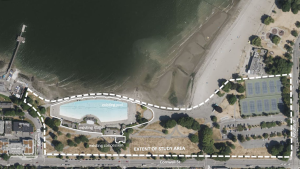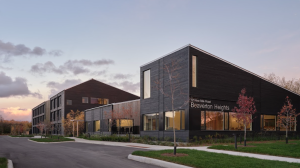A modular project to shelter Vancouver’s homeless has become a magnet for protest and a test bed for new forms of housing.
Vancouver Mayor Gregor Robertson announced on Oct. 26, 2017 that the city planned to build 78 modular homes at the Pearson-Dogwood site in the Marpole neighbourhood at 7430 and 7460 Heather Street (650 West 57th Ave). The city gave conditional approval on Nov. 27, 2017 of a development permit for the project.
The Marpole project is part of a larger effort by the City of Vancouver to employ modular units in order to quickly provide housing for homeless people, aided by $66 million in funding from the province. Vancouver City Council had also previously approved a bylaw change allowing temporary modular housing to be built without a long public hearing process, if the land in question does not have to be rezoned.
Mike Burdick, a spokesperson for the Marpole Residents Coalition, said his main concern is the lack of transparency he perceived in the process.
“It’s really one large issue: the complete lack of consultation from the city,” Burdick said.
On Oct. 23, Burdick said, City of Vancouver director of housing policy and projects Abigail Bond updated community representatives on the development and indicated the city wanted the modular facilities operational by Christmas. Burdick said he expressed doubts that the city’s timeline could be met.
As part of the development permit process, a Vancouver news release stated, the city hosted four community information sessions in Marpole, held meetings with community groups and solicited feedback online and via comment cards.
Residents were also concerned the site chosen is located near three different schools, while other temporary modular housing in the city is planned for industrial and semi-industrial areas.
“We have semi-industrial, but they chose to put it across the street from schools,” Burdick stated.
Marpole residents recently held protests to block construction of the units and on Dec. 4 the Supreme Court of BC granted an injunction to the City of Vancouver, the Provincial Rental Housing Corporation and the BC Housing Management Commission to prevent protestors from blocking access to the site.
Vancouver-based developer Onni owns the land where the temporary housing will be installed and plans to build 2,700 residential units on the site, with over 500 units set aside for affordable housing and over 100 planned as supportive-housing units.
However, construction would be in phases and in the interim the modular housing could occupy the space.
“The new bylaw allows for the temporary use of modular housing on the site,” said Vancouver Affordable Housing Agency (VAHA) director and CEO Luke Harrison.
City of Vancouver by-law 11902, enacted on Sept. 20, allows the city’s director of planning or the development permit board to relax restrictions on building to allow low-cost housing for people receiving assistance.
Marpole residents in a group called Caring Citizens of Vancouver Society filed a petition through legal counsel to the Supreme Court of B.C. for judicial review on Dec. 8, which sought to have the court declare bylaw 11902 outside the powers of Vancouver City Council, and expressed concerns the city deprived the public of a public hearing process.
The Marpole project is not the city’s first attempt to use modular housing to address homelessness. A pilot project at Main and Terminal near the downtown core “was a way to explore the temporary use of sites for housing,” Harrison said.
“The area is going through zoning changes that apply to construction through the interim period before building and that gives us an opportunity to put in a site and move it down the road in a way that doesn’t impact longer term use of the site. The Onni site will be a large, multi-use site, and VAHA licensed part of that site for temporary use.”
Providing temporary modular housing has been a new challenge not only for urban planners and administrators but for manufacturers and suppliers, Harrison added.
“We looked at modular suppliers across North America and most are well established in the oil and gas and resource sectors, but not as much in the residential or urban sector,” he said.
VAHA employed Horizon North, a Calgary-based modular construction firm with offices throughout Alberta and in Kamloops, B.C., to build both the Terminal and Main housing and the structures in Marpole.
“These companies are learning how to get through the process alongside us,” Harrison added.
“They’re learning that a good collaboration with communities is critical to urban development.”
Modular housing could also address wider concerns about housing affordability in the Lower Mainland, Harrison said.
“With where costs are going now, and with Horizon North building in Kamloops, they can operate around the clock and are under different labour constraints. On a cost basis, this makes modular competitive with wood frame and concrete construction,” Harrison said.











Recent Comments